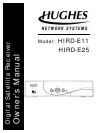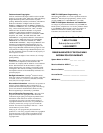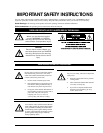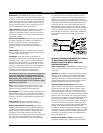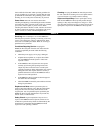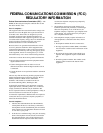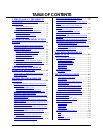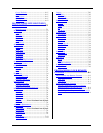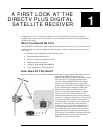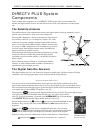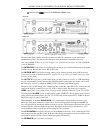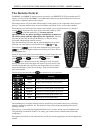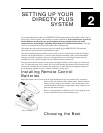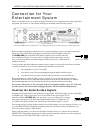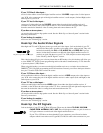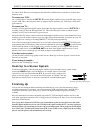
FEDERAL COMUNICATIONS COMMISSION (FCC)
REGULATORY INFORMATION
Federal Communications Commission (FCC)—The
DIRECTV PLUS System complies with both Part 15 and
Part 68 of the FCC rules.
Part 15 compliance—
This equipment has been tested and found to comply with
the limits for a Class B digital device, pursuant to Part 15
of the FCC rules. These limits are designed to provide
reasonable protection against harmful interference in a
residential installation. This equipment generates, uses and
can radiate radio frequency energy and, if not installed and
used in accordance with the instructions, may cause
harmful interference to radio communications.
However, there is no guarantee that interference will not
occur in a particular installation. If this equipment does
cause harmful interference to radio or television reception,
which can be determined by removing and applying power
to the equipment, the user is encouraged to try to correct
the interference by one or more of the following measures:
• Reorient or relocate the receiving satellite dish antenna.
• Increase the separation between the equipment and the
digital satellite receiver.
• Connect the equipment into an outlet on a circuit
different from that to which the digital satellite receiver
is connected.
• Consult the dealer or an experienced radio/TV technician
for help.
The user may find the following booklet, prepared by the
Federal Communications Commission, helpful: “How to
Identify and Resolve Radio and TV Interference
Problems.” This booklet is available from the U.S.
Government Printing Office, Washington, DC.
To meet FCC requirements, only peripherals (computer
input/output devices, terminals, printers, etc.) certified to
comply with the Class B limits may be attached to this
device. Operation with non-certified peripherals is likely to
result in interference to radio and TV reception.
To meet FCC requirements, shielded cables are required to
connect the device to a personal computer, peripheral, or
other Class B certified device.
Part 68 compliance—
1. The FCC has established Part 68 of the FCC Rules,
which permit this device to be directly connected to
the telephone network. Standardized jacks are used for
these connections. This equipment should not be used
on coin lines or party lines.
2. If this device is malfunctioning, it may also be causing
harm to the telephone network; this device should be
disconnected until the source of the problem can be
determined and until repair has been made. If this is
not done, the telephone company may temporarily
disconnect service.
3. The telephone company may make changes in its
technical operations and procedures; if such changes
affect the compatibility or use of this device, the
telephone company is required to give adequate notice
of the changes. You will be advised of your right to
file a complaint with the FCC.
4. If the telephone company requests information on
what equipment is connected to their lines, inform
them of:
• the telephone number this unit is connected to.
• the ringer equivalence number (REN). The number
can be found on a label located on the bottom of the
equipment.
• the Universal Service Order Code (USOC) jack
required. This equipment requires a USOC RJ11
jack.
• the FCC registration number. The number can be
found on a label located on the bottom of this
equipment.



